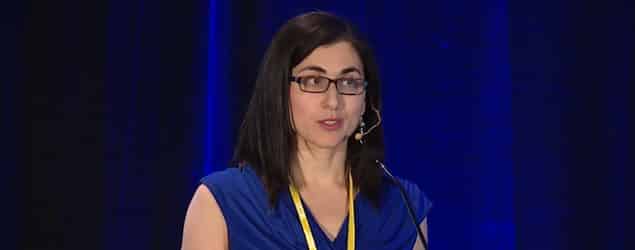Anniversary Chapters: Andrew Bernstein Discusses “Atlas Shrugged as the Culmination of the Romantic Novel”

“It always intrigued me that the great romantic writers are impassioned moralists who seek to change the world,” said Andrew Bernstein, the next author in our series celebrating the 60th publication anniversary of Ayn Rand’s Atlas Shrugged. “Yet in their novels, these authors can only rarely imagine a way for their heroes to succeed.”
Bernstein was discussing the genesis of the chapter he contributed to Robert Mayhew’s book Essays on Ayn Rand’s “Atlas Shrugged.” The chapter is titled “Atlas Shrugged as the Culmination of the Romantic Novel.”
“I looked at the greatest romantic novels — Hugo’s Les Misérables, Dostoyevsky’s The Brothers Karamazov and Ayn Rand’s Atlas Shrugged — and realized something. At the end of Hugo’s masterpiece, the main heroes are all dead, while society remains as cruelly inhumane to its lower classes as it was before they lived. At the end of Dostoyevsky’s greatest novel, the four brothers are all punished for, or paralyzed by, their guilt in their father’s murder — but human nature remains the same roaring pesthole of sin-driven iniquity it was at the story’s inception.
“Only in Ayn Rand’s great novel has the evil collapsed at the hands of the good — and the heroes are poised to re-make the world. I asked myself why and realized that only man’s mind can lead to flourishing earthly life — and that these three great writers hold sharply contrasting theories regarding the mind’s role in human life.
“Hugo respects reason — Enjolras is a brilliant student and Jean Valjean does his greatest good by developing a new manufacturing method — but in the end, the novel projects the view that it is love, not reason, that is insufficiently present in the world. But in reality, love is an emotion — it’s incapable of growing food, building houses, or curing disease. It can’t rescue the starving poor from their suffering. It takes reason to grow food in abundance.
“Dostoyevsky rejects and reviles reason in favor of faith. The supposedly saintly heroes of his story have no chance to transfigure the world. It is only John Galt and his allies, men and women of the mind, who can and do positively transform the world. And that’s true in real life, where the great heroes of the Enlightenment, the Industrial Revolution and the American Revolution — Newton and Locke, Watt and Boulton, Franklin and Jefferson and Madison — transformed an oppressed and famine-ridden Western world into a home for the freest and wealthiest societies of history, by virtue of magnificent intellectual achievements.
“The mind triumphs in real life, and it’s Rand’s recognition of this truth that enables her heroes to achieve the felicitous results futilely sought for by the heroes of Hugo and Dostoevsky.”
In his chapter, Bernstein treats each of these three novels in turn, sketching its plot, describing its main characters, and summarizing the author’s view of man’s nature and powers. Here’s an excerpt that captures the breadth of his theme:
Observe first an important truth regarding human nature shared in common by these writers. In Les Misérables, man is confronted by a fundamental alternative: humane benevolence or callous indifference. In The Brothers Karamazov, man is confronted by a different basic alternative: God or the devil. In Atlas Shrugged, man is again confronted with a fundamental alternative: rationality or irrationality. It is not just Jean Valjean or the four Karamazov brothers or John Galt and the strikers who face these choices in their respective universes; rather, all human beings must choose between them; none can escape the necessity of fundamental choice. All men are ultimately either humane or inhumane — Godly or ungodly — rational or irrational. When the intellectual themes are inductively extracted from the specific events of these books, the truth of one of Ayn Rand’s esthetic principles is confirmed: romanticism is the literary school that recognizes and upholds the principle of man’s volition.
Andrew Bernstein is the author of several books — most recently A Dearth of Eagles, a novel — and a lecturer who appears on college campuses and many other venues around the world. His areas of expertise include Objectivism, Ayn Rand’s novels, the nature of heroism, the history of capitalism and its moral superiority to other systems, and application of the principle of individual rights to a broad array of topical issues.
If you find these perspectives intriguing, Essays on Ayn Rand’s “Atlas Shrugged” is available here, and more on Atlas Shrugged is available here.



